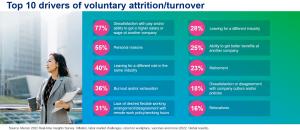Salary increments for 2023 back to pre-pandemic levels as Malaysia bounces back: Mercer survey
Overall median salary increments projected to hit 5% in Malaysia next year, up from 4.8% this year
KUALA LUMPUR, MALAYSIA, November 10, 2022 /EINPresswire.com/ -- Employees in Malaysia can look forward to a median 5% increase in their salaries next year, according to Mercer’s annual Total Remuneration Survey (TRS) 2022. The TRS polled 637 organisations – of which 98% are multi-national companies (MNCs) – across 17 industries in Malaysia between April and June this year.This return to the pre-pandemic level seen in 2019 reflects growing optimism among employers about their business and overall market outlook. Malaysia’s Gross Domestic Product (GDP) is estimated to grow by 6.4% this year, exceeding pre-pandemic levels of 4.4% in 2019. Malaysia’s median salary increment is also above the Asia Pacific average of 4.4%. Across Asia, the overall median salary increases reflect a divergence in pay progression between emerging and developed economies, with estimates as high as 7.1% in Vietnam to 2.2% in Japan, the lowest in the region.
Koay Gim Soon, Mercer’s Career Business Leader for Malaysia, said, “With Malaysia rebounding from the pandemic, companies, especially the MNCs, are more certain about the future and are ramping up their business activities to cope with increased demands. Nevertheless, larger firms will need to keep abreast of the latest reward trends and developments to ensure they have a relevant and reliable talent pool. Small to medium enterprises (SMEs), which have relatively fewer resources, on the other hand, need to double down on their business priorities while ensuring that their compensation and benefits packages are competitive in order to attract and retain the right talent.”
Higher salary increments across most industries:
Across the industries surveyed, the Retail and Consumer Goods industries are expected to see the biggest upturn in salary increment of 5% in 2023, up from 4.5% and 4.6% respectively in 2022. Shared Services & Outsourcing (SSO) and High-Tech industries maintain their 5% increase from this year, signaling the relative stability of both industries amidst inflationary pressures and supply chain issues.
Employees, except for those from the High-Tech industry, can also expect higher bonus payouts this year, based on Mercer’s mid-2022 forecast. The Retail industry is expecting the biggest jump to 12.6%, from 8.1% in 2021, followed closely by the Consumer Goods industry with an increase to 16%, from 13.7% the previous year. SSO is forecasting the highest payout of 20.3%, exceeding High Tech’s 19.9%, which reflects the former’s growth potential in Malaysia leading to greater competition for talent.
On industry salary trends, Mr Koay said, “The higher projected salary increments and bonus payouts for the Retail and Consumer Goods sectors are underpinned by strong consumer spending and the economy reopening. However, employers are also keeping a close eye on global headwinds including inflation and supply chain disruption which may dampen growth in the year ahead. Hence, the Retail and Consumer Goods industries, despite recording the highest increases from 2021 to 2022, remain the most conservative in their forecasted bonus payouts.”
Labour market continues to stabilise:
While the total unemployment rate has returned to pre-pandemic levels this year, the survey also found that companies are taking a more cautious approach in their 2023 hiring intentions. 30% of organisations surveyed (vs 39% in 2022) intend to increase their headcount, while 1% (vs 3% in 2022) plan to decrease their headcount in 2023.
Mr Koay adds, “Voluntary attrition is still below pre-pandemic levels for most industries, but gradually rebounding, particularly industries such as Shared Services & Outsourcing, High Tech, and Chemicals where skilled talent remains highly sought after. While a robust compensation strategy remains critical, employee engagement should also be prioritised as a retention strategy, especially to address employees’ needs such as physical and mental well-being, work-life balance, career progression and more.”
According to a Mercer Pulse Survey conducted earlier this year, among the key drivers of employee turnover this year were dissatisfaction with their current pay and the ability to get higher salaries from other companies (77%); burnout and exhaustion (36%) and the lack of desired flexible work arrangements (31%).
The increase in minimum wage that was implemented in May is expected to improve the financial wellbeing of lower income employees and bring about economic growth. However, the rise in employment cost could also add pressure on businesses that are more labour-intensive and less financially-resourced. SMEs especially may respond with cost-adjustment measures such as reduction in margins and increase productivity through automation.
________________________________________
[1] https://www.theedgemarkets.com/article/world-bank-ups-2022-gdp-growth-forecast-malaysia
[2] The Asia Pacific average excludes India as its data is unavailable as of 10 Nov 2022.
Michelle Tan
Mercer
+65 9119 8601
michelle.tan@mercer.com
Legal Disclaimer:
EIN Presswire provides this news content "as is" without warranty of any kind. We do not accept any responsibility or liability for the accuracy, content, images, videos, licenses, completeness, legality, or reliability of the information contained in this article. If you have any complaints or copyright issues related to this article, kindly contact the author above.



